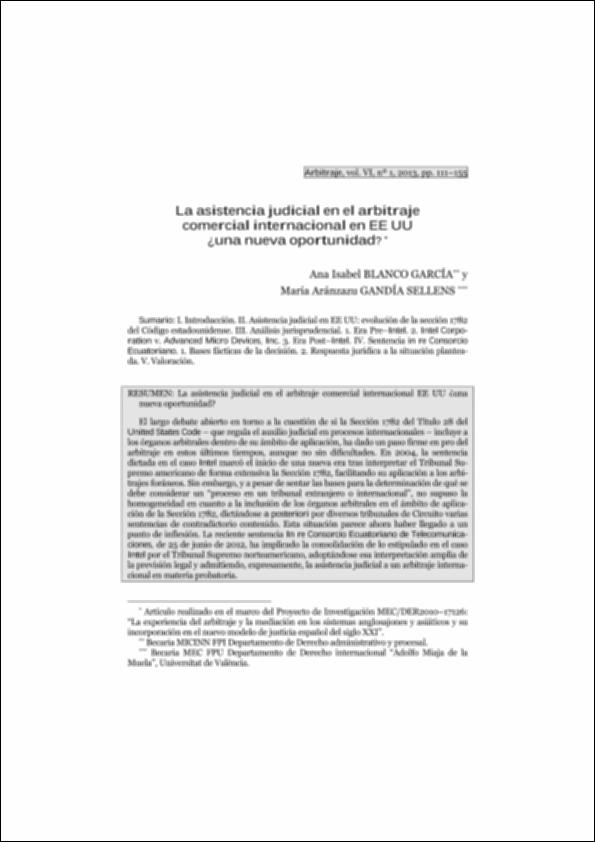Please use this identifier to cite or link to this item:
http://hdl.handle.net/10637/13101La asistencia judicial en el arbitraje comercial internacional en EE UU : ¿una nueva oportunidad?.
| Title: | La asistencia judicial en el arbitraje comercial internacional en EE UU : ¿una nueva oportunidad?. |
| Authors : | Blanco García, Ana Isabel Gandía Sellens, María Aránzazu |
| Keywords: | 28 U.S.C. § 1782; Asistencia Judicial Internacional; Arbitraje; Prueba; Tribunal extranjero; Tribunal extranjero; International Judicial Assistance; Arbitration; Evidence; Foreign tribunal |
| Abstract: | El largo debate abierto en torno a la cuestión de si la Sección 1782 del Título 28 del
United States Code – que regula el auxilio judicial en procesos internacionales – incluye a
los órganos arbitrales dentro de su ámbito de aplicación, ha dado un paso firme en pro del
arbitraje en estos últimos tiempos, aunque no sin dificultades. En 2004, la sentencia
dictada en el caso Intel marcó el inicio de una nueva era tras interpretar el Tribunal Supremo americano de forma extensiva la Sección 1782, facilitando su aplicación a los arbitrajes foráneos. Sin embargo, y a pesar de sentar las bases para la determinación de qué se
debe considerar un “proceso en un tribunal extranjero o internacional”, no supuso la
homogeneidad en cuanto a la inclusión de los órganos arbitrales en el ámbito de aplicación de la Sección 1782, dictándose a posteriori por diversos tribunales de Circuito varias
sentencias de contradictorio contenido. Esta situación parece ahora haber llegado a un
punto de inflexión. La reciente sentencia In re Consorcio Ecuatoriano de Telecomunicaciones, de 25 de junio de 2012, ha implicado la consolidación de lo estipulado en el caso
Intel por el Tribunal Supremo norteamericano, adoptándose esa interpretación amplia de
la previsión legal y admitiendo, expresamente, la asistencia judicial a un arbitraje internacional en materia probatoria. The long lasting debate related to the question of whether the Section 1782 of Title 28 of the United States Code – which regulates judicial assistance in international processes– includes arbitral bodies within its scope, has taken a firm step towards in favor of arbitration in these latter times, albeit not without challenges. In 2004, the ruling of the Intel case marked the beginning of a new era after the U.S. Supreme Court interpreted extensively Section 1782, by facilitating its application to foreign arbitrations. However, despite the consolidation of the basis for determining what should be considered as a “process in a foreign or international court”, it didn’t manage to establish the sufficient homogeneity with regard to the inclusion of arbitral bodies in the scope of Section 1782, by pronouncing a posteriori contradictory rulings by different Circuit Tribunals. This situation now seems to have reached a tipping point. The recent decision of In re Consorcio Ecuatoriano de Telecomunicaciones, of June 25th, has supposed the consolidation of several criteria established within the Intel case settled by the United States Supreme Court, thus accepting the broader interpretation of the legal provision and granting, in an express manner, judicial assistance for international arbitration regarding evidentiary matters. |
| Description: | En: Arbitraje: revista de arbitraje comercial y de inversiones. eISSN. 2603-9281. vol. 6, n. 1, 2013, pp 111-155 |
| URI: | http://hdl.handle.net/10637/13101 |
| Rights : | http://creativecommons.org/licenses/by-nc-nd/4.0/deed.es |
| Issue Date: | 1-Apr-2013 |
| Appears in Collections: | 2013 Arbitraje nº 1 |
Items in DSpace are protected by copyright, with all rights reserved, unless otherwise indicated.


